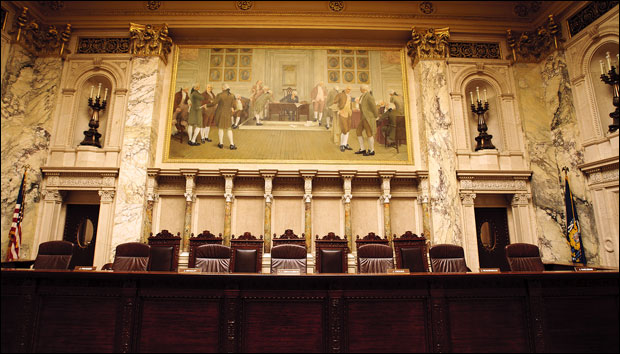Judge argues for civil appointments before state Supreme Court (UPDATE)
By: Jack Zemlicka, [email protected]//October 5, 2011//
Judge argues for civil appointments before state Supreme Court (UPDATE)
By: Jack Zemlicka, [email protected]//October 5, 2011//
Several judges and court commissioners made their case Tuesday before the state Supreme Court for a petition to provide appointed counsel in civil cases for pro se clients.
John Ebbott, executive director of Legal Action of Wisconsin, submitted the petition, which asks the court to amend Supreme Court Rule 11.02 and establish criteria for court-appointed counsel at public expense for indigent litigants, defined as having an income below 200 percent of the federal poverty guidelines.
Judges who spoke at Tuesday morning’s hearing argued that appointment of counsel in foreclosure or child custody cases could save time and ensure litigants receive fair treatment.
“Indigent persons without counsel cannot perform the same tasks as an attorney,” Mary Triggiano, Milwaukee County Circuit Court judge, told the court. “When those aren’t done, judges struggle to make decisions and fairness is compromised.”
Chief Justice Shirley Abrahamson questioned presenters on why judges don’t appoint counsel now, given they have the authority to do so.
Judges have the ability, Triggiano acknowledged, to make appointments in some civil cases and are required to do so in child neglect cases. But, she said, many judges likely are unaware of that authority and others simply chose not to do so because appointments typically cost counties $60 an hour.
“Judges feel somewhat paralyzed and crippled by any kind of cost implications,” Triggiano said.
While the Constitution mandates legal representation in criminal cases, there is no such provision for civil litigation.
According to the petition, counsel would be appointed to “protect the litigant’s rights to basic human needs, including sustenance, shelter, clothing, heat, medical care, safety and child custody and placement.”
In deciding whether an attorney should be appointed, the court can take into account the personal characteristics of the litigant, such as age, mental capacity, education, knowledge of the law and complexity of the case.
The court did not vote on Ebbott’s petition Tuesday, but with an estimated cost of $56 million per year — including $11 million in Milwaukee County — some suggested implementing the system would require counties to cut court budgets to pay for the appointments.
“The money is simply not there,” David Callender, legislative associate for the Wisconsin Counties Association, told the court. “If there has to be an appropriation it would come from other services and in all likelihood from other court services.”
Callender did not elaborate on specific cuts, but the association formally opposed the petition based on economics.
During Tuesday’s hearing, Justice Annette Ziegler asked how much courts could afford to sacrifice to pay for the appointments.
“What can counties eliminate in the budget to create this funding source?” she said. “What are we willing to give up?”
Legal News
- Gov. Evers seeks applicants for Dane County Circuit Court
- Milwaukee man charged in dismemberment death pleads not guilty
- Democratic-led states lead ban on the book ban
- UW Madison Professor: America’s child care crisis is holding back moms without college degrees
- History made in Trump New York trial opening statements
- Prosecutor won’t bring charges against Wisconsin lawmaker over fundraising scheme
- Republican Wisconsin Senate candidate says he doesn’t oppose elderly people voting
- Vice President Harris to reveal final rules mandating minimum standards for nursing home staffing
- Election workers fear threats to their safety as November nears
- Former law enforcement praise state’s response brief in Steven Avery case
- Eric Toney announces re-election bid for Fond du Lac County District Attorney
- Former Wisconsin Democratic Rep. Peter Barca announces new bid for Congress
WLJ People
- Power 30 Personal Injury Attorneys – Russell Nicolet
- Power 30 Personal Injury Attorneys – Benjamin Nicolet
- Power 30 Personal Injury Attorneys – Dustin T. Woehl
- Power 30 Personal Injury Attorneys – Katherine Metzger
- Power 30 Personal Injury Attorneys – Joseph Ryan
- Power 30 Personal Injury Attorneys – James M. Ryan
- Power 30 Personal Injury Attorneys – Dana Wachs
- Power 30 Personal Injury Attorneys – Mark L. Thomsen
- Power 30 Personal Injury Attorneys – Matthew Lein
- Power 30 Personal Injury Attorneys – Jeffrey A. Pitman
- Power 30 Personal Injury Attorneys – William Pemberton
- Power 30 Personal Injury Attorneys – Howard S. Sicula












